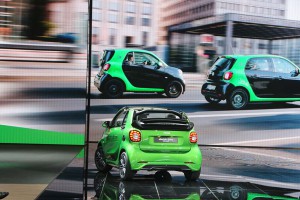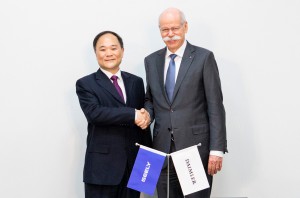After years of trying, Daimler AG is ready to give up trying to sell Smart cars in the United States.
The German automaker said it plans to suspend sales of all-electric Smart EQ fortwo cars in the United States and Canada this fall at the end of 2019 model year. Officials from Mercedes-Benz USA have confirmed after reports of the brand’s demise in the U.S.
The Smart EQ is currently the only Smart model on sale in the U.S. but through the first quarter Smart sales have fallen to less than 300 units, leaving the brand in dire straits.
Smart was created in 1998 in a partnership with Swatch but never took off. Daimler, trying to re-energize the brand, announced in 2017 the line-up would go full electric. But global sales fell 4.6% to 128,802 globally and in the U.S. many dealers stopped selling the fortwo. Sales dwindled to 1,276 in the U.S. last year — a 58% drop.
(Daimler earnings fall 37% as Mercedes sales stumble. Click Here for the story.)
“Mercedes-Benz will carry forward its electric strategy in the U.S. and Canada with the arrival of the new EQC in 2020,” said Mercedes-Benz, which is responsible for Smart sales in the U.S. and Canada, in a statement.
“MBUSA and Mercedes-Benz Canada will continue to provide owners of gasoline-powered and electric smart fortwo models with access to service and replacement parts via smart and authorized Mercedes-Benz dealers.”
(Click Here for details about Geely getting Smart with Daimler.)
The announcement of the Smart’s demise in the U.S. market also suggests that Daimler’s electric vehicle strategy is continuing to evolve with the launch of the new EQ brand. The all-electric EQ vehicles are larger than a Smart car and thus more versatile and promise to have greater appeal than the Smart electric.
In addition, Daimler AG announced that it had sold a share of the Smart brand to Geely, which emerged as one Daimler’s major shareholders in 2018. Geely also own Volvo and its all-electric Polestar brand, which also plans to sell in EVs in the U.S. where the demand for EVs is still relatively tiny.
(Smart looks to be on the chopping block at Daimler — again. Click Here for the story.)
Once billed as the answer for motorists in heavily populated urban areas like Brooklyn, the Smart fortwo was caught in a pincer between American preferences for larger vehicles and the rise of small utility vehicles that were relatively easy to park and contain more room for passengers and cargo than the Smart cars.


